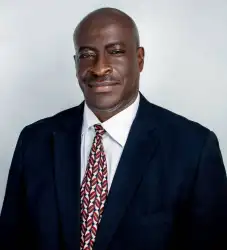Zimbabwe and South Africa are neighboring countries that share a lot in common, despite the fact that South Africa is almost three times the size of Zimbabwe. Both countries were dominated economically by white settlers who made these countries their home with little intention to relocate or resettle elsewhere. Both countries eventually gained political power from the white settlers and installed black African heads of state: Robert Mugabe for Zimbabwe and Nelson Mandela for South Africa.

Robert Mugabe and Nelson Mandela shared a lot in common as well. Both leaders were fierce African nationalists, who were imprisoned and abused by white governments. Both were vilified by Western governments at various points in their lives. Both leaders had plenty of reason to be bitter against their white oppressors; they each lost a son while they were in prison and were unable to bury their child.
Both men expanded their education while in prison: Mandela studied for his LLB, studied Islam, and learned Afrikaans, while Mugabe obtained a masters in economics, bachelor of administration and a law degree. Both men eventually became head of state. They both desired for their respective countries to be havens of self-actualization for their fellow black citizens.
Unfortunately the fortunes of their respective countries during and after their head of state tenure stand in stark contrast to each other. From 1980 to 2010, while Mugabe served as head of state, the economy of Zimbabwe went through a slow but steady decline; the GDP per capita income fell from US$947 in 1980 to US$352 in 2008.
By contrast, the GDP per capita income of South Africa was US$3548 in 1994 when Nelson Mandela became President of South Africa and when Mandela left office in 1999 the GDP per capita was US$3268, a slight decrease but not as steep as the decrease in per capita income in Zimbabwe during the same time period (US$634 in 1994 to US$585 in 1999).
Zimbabwe suffered a massive loss of talent, capital, investment and goodwill during the tenure of Mugabe while South Africa managed to retain its talent, capital, investment and enhance its goodwill while Mandela was the head of state. What is it that made the difference between the two countries’ fortunes under their respective leaders?
Dear African leader, never underestimate the impact that your leadership will have on your organization or country. There are three primary differences between Mandela and Mugabe that led to the divergence of fortunes between their two countries during their tenures of leadership. These are (1) the courage to be a statesman; (2) self-discipline; and (3) Humility.
- Courage to be a statesman
When Mugabe assumed the position of head of state, Zimbabwe was in a state of turmoil, having experienced civil war for the better part of the previous decade. Tribal strife was rife, and it was not just blacks against whites. Within the black communities in Zimbabwe, there were deep divisions and mistrust that characterized their relationships. South Africa was also in a similar situation when Mandela took over.
For decades under apartheid, blacks had been marginalized and it was largely due to the fear of a devastating descent into civil war that led President de Klerk to order the release of Mandela and the end of apartheid while led eventually to his Mandela’s rise to the Presidency.
As with Zimbabwe, the divisions in South Africa were not limited to blacks against whites; within the black communities, there were deep divisions and incidences of black on black violence based on tribal differences were also rife. Both men had people of their tribe and color who fought and bled and suffered to facilitate their rise to power, people who expected to be rewarded for their sacrifice.
However, Mandela recognized that when he was appointed to be the head of state he became the statesman..the leader for the entire country, including those who liked him and those who did not, those who looked like him and those who did not, those who suffered for him and those who did not. Mandela was deliberate in ensuring that he chose a multicultural and multiracial cabinet, entourage and Presidential office.
He angered many of his kinsfolk when he selected a white secretary and a black secretary to accompany him on international trips; he upset them when he supported the South Africa rugby team by wearing the Springbok jacket; he appointed F.W. de Klerk (white) and Thabo Mbeki (black) as Vice-Presidents of South Africa. Mandela considered his primary role as President to lead in fostering national reconciliation.
As President he saw to it that all tribes in South Africa were represented in seats of power and he worked hard to ensure that his own tribe and party did not exercise disproportionate or retaliatory power in South Africa. One of his critics who did not understand this behavior was Robert Mugabe, who accused Mandela of being too good to white people at the expense of blacks in his own country.
This criticism is not surprising, given Mugabe’s choices when it came to governance. Despite his initial pledge of national reconciliation during his inauguration in 1980 and an initial cabinet that contained members of rival political parties and white Zimbabwean ministers, Mugabe lacked the patience that being a statesman required.
After violent attacks on his party (ZANU PF) offices that were allegedly done by white Zimbabweans and being publicly criticized by Nkomo, one of his former rivals during the civil war, Mugabe threw off all pretense of national unity and fell squarely in line with the wishes of his tribesmen and party fellows to malign the other tribes and the white Zimbabweans, especially publicly. With their head of state eschewing statesmanship, the white Zimbabweans started to leave Zimbabwe in droves and non-Zanu PF members were purged from government.
The flight of talent and investment and the empowerment of Zanu PF members to capture the state and national assets for their private use and enrichment led to a rapid decline in economic fortunes for Zimbabwe. This is a lesson that many African Presidents still struggle to learn; when you are vying for office, you are the leader of your political party, but when you are sworn in as President you become the leader of all the parties and all the people and you must become the statesman that is willing to unify the country even at the risk of angering your party faithful. This is how you start to build your country.
- Self-discipline
Mugabe grew up under the instruction of Jesuits and under their influence he became a disciplined child. Mandela grew up as the son of a King and in his younger years was quite indisciplined, engaging in womanizing behavior that led to the demise of his first marriage. Both of them mustered enough self-discipline to pursue further studies while in prison. Post prison, however, their levels of self-discipline moved in divergent directions.
Mandela was a stickler for self-discipline; he ate sparingly and always frowned on taking “second helpings” at the table. He regularly exercised, even though he was in his seventies. He believed in being on time every time and did not allow himself to be late for meetings or to be held up in waiting rooms because someone else was late for a meeting with him.
One of the incidences that contributed to a frosty relationship between Mandela and Mugabe is recounted by his secretary, Zelda La Grange in her book “Good morning Mr. Mandela”. It occurred during a SADC (Southern African Development Community) meeting held in Mauritius in 1998 involving the heads of state of the Southern African countries (including South Africa and Zimbabwe).
She writes, “The meeting was scheduled to start at 10 AM, but President Mugabe from Zimbabwe entered the room more than an hour late. While President Mugabe entered, another head of state was busy addressing the meeting. President Mandela interrupted him and asked him to stop his address. President Mandela waited for President Mugabe to be seated and then launched into an off-the-cuff speech of about twenty minutes about being disrespectful and wasting other people’s time and that ‘some heads of state’ considered themselves more important and therefore thought it was acceptable to arrive late.”
Mugabe had developed indisciplined habits after his incarceration and these habits manifested themselves in hubris, lateness, corruption, and marital infidelity. As a result of his lack of self-discipline, Mugabe lacked the moral authority to hold his party members accountable to discipline themselves and the ZANU PF members became wealthy by corruptly ripping the state of its assets. This created a lack of trust in the government and a lack of uniform implementation of policy that contributed to capital flight from Zimbabwe.
In contrast, Mandela set an example of discipline and leveraged his moral authority to hold his cabinet accountable to such standards, leading to trust in the government’s policies and policy implementation that kept industries and factories in South Africa and attracted further investment into South Africa.
- Humility
This is the third key area in which Mandela and Mugabe diverged. Mandela believed that he was part of a collective and recognized his own limitations. He also believed that he was not the smartest, or most capable person in South Africa and was willing to step down from the highest office in the land after one term because he knew that there were other South Africans that could do just as good a job at leading the country as he could.
And he was right. During the five years after Mandela left office, Thabo Mbeki led South Africa through a period of economic boom. In contrast, Mugabe believed that he was the only one who could lead Zimbabwe effectively and stayed on long after he became ineffective. His lack of humility led him to a state of hubris that was manifested in many of the egotistical (but humorous) statements that he would make.
Sadly for Zimbabwe, as Mugabe’s hubris grew, the voices of dissent around him grew smaller and his decision-making became worse as he became increasingly isolated in an echo chamber of his own making.
Conclusion
Dear African leader, as you lead your community, state or country, please remember that it is better to be a statesman than to be a tribalist. Remember that you are responsible for improving the lives of all the people that live in your community/country, and not just the people that look like you or speak your native tongue. Embrace self-discipline so that you can create a better society for the citizens who depend on your decision-making for their lives to improve. And remember that as good as you think you are, there is someone better out there for whom you must make way to shine and lead in the very near future. Your citizens are calling on you for great leadership.
>>>the writer is a scholar and practitioner of organizational development and leadership and a leadership Coach and Facilitator. Over the past three decades, he has successfully coached and trained leaders in Africa, North America, and Europe. His passion for leadership enhancement was born out of his experiences as a cadet in the U.S. Military Academy (West Point) and as a military officer serving in combat in the Sierra Leone Civil War where he was shot twice. As the only Sierra Leonean with a Ph.D. in Leadership, Modupe was the founding Dean of the African Leadership University School of Business, an institution providing a Pan-African MBA degree to Africa’s mid-career professionals. He is the Founder and CEO of BCA Leadership (www.bcaleadership.com), an organization that has impacted over 3000 African leaders with coaching and knowledge-sharing services. He leads a team of thirty-two Coaches across Africa and he is the curator of The Made in Africa Leadership Conference. Contact Modupe through email at [email protected]
To register for The Made in Africa Leadership Conference scheduled for 12 & 13 June, 2024 in Nairobi in Kenya, visit www.bcaleadership.com










